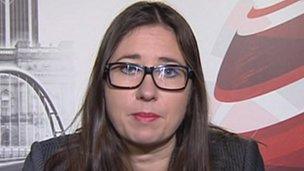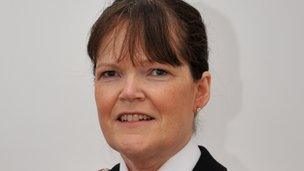Domestic violence initiative: Expert opinions
- Published
The Home Office is to widen the definition of domestic abuse in England and Wales to include those aged 16 and 17 as well as a wider range of intimidating or threatening behaviour, so-called coercive control. Experts have welcomed the initiative but some have highlighted challenges that remain to ensure victims are protected.
'Changing mindsets'
Professor Marianne Hester, head of the Centre for Gender and Violence Research at the University of Bristol, says the nature of domestic violence in society is often misunderstood and believes the new guidelines will help change people's "mindset" of what it involves.
"Up to now the Home Office definition of domestic violence has been about individual acts of behaviour when it is often about a pattern of power and control over time. By recognising coercive control, you acknowledge such a pattern exists.
"Lowering the age classification was important as the highest rate of domestic violence is for people between the age of 16 and 25 and the 16 to 18 group were not being identified. This begins to overcome that problem."
'New law needed'
Lawyer Rachel Horman from Blackburn-based Watson Ramsbotton helps victims of domestic violence and wonders if the failure to introduce a new law will hinder prosecutions.

"The government is expecting police to use existing legislation under the Protection from Harassment Act. But it is very under-used... and without a real investment in... training the police, the CPS and even the judiciary in relation to the devastating effects of psychological abuse can have on victims, I'm worried that it still won't be taken seriously and it will still just be seen as couples arguing.
"There are specialist police units that do deal with domestic violence and take it very seriously but the general bobby on the beat isn't necessarily very well trained in that and I do think sometimes they do lack empathy. It would certainly help if a new offence of coercive control was created because it would give police much more to work with.
"However, there's a huge problem with young teenagers experiencing domestic violence - from parents, from brothers, from partners. To be fair, the police do deal with domestic violence incidents involving teenagers but they couldn't classify it as such."
Policing emotions
Richard Garside, director of the Centre for Crime and Justice Studies, suggests new challenges could emerge for police and prosecutors.
"Domestic abuse, whether psychological or physical, is always wrong.
"The law helps to set the tone but it can be a blunt instrument in policing complex emotions and relationships.
"The challenge will be to distinguish between the love-sick teenager acting in an immature and inappropriate way and the individual engaging in intimidating, dangerous and controlling behaviours."
'More help'
Chief Constable Carmel Napier, of the Association of Chief Police Officers, says more victims from all ages and sexes will be now protected.

"Domestic abuse may often include coercive control - a complex pattern of abuse using power and psychological control. These incidents may vary in seriousness and are often repeated over time. However, coercive control was not previously reflected in the government's definition of domestic violence.
"Acpo supports the home secretary's amendments to the cross-government definition of domestic violence. The amendments... are key in helping to raise awareness and enable effective prevention working in partnership with all agencies.
"Domestic abuse ruins lives - in some cases it ends in homicide. This amended definition will help us all to work together to defeat this dreadful crime."
Funding concerns
Deborah McIlveen, policy manager for the charity Women's Aid, says the government has listened to the voices of professionals but she remains concerned about help for victims.

"The challenge is now to ensure that police officers are able to identify coercive control and take appropriate action for both adult survivors and 16-18 year olds. This will require the development and implementation of procedures accompanied by comprehensive training.
"It is vital that every Police and Crime Commissioner (PCC) in England chooses to prioritise domestic violence and that sufficient resources are allocated from each PCC budget to ensure police respond appropriately to domestic and sexual violence victims in local areas.
"PCCs must commission refuge and outreach services in order for adult and child survivors in their area to be able to access safety and support, irrespective of any justice processes."